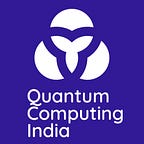Quantum Computing Primer| Introduction — Chapter1
We are gonna understand the basics of Quantum Computing in a series of articles here. It’s very easy to geek out and go down the rabbit holes of the history of quantum physics which inter connects to aliens and their statues and how it disappears when you see them etc. So we’ve put together a framework to keep the learnings structured here. This is gonna be a multi-part series so do subscribe.
Table of Contents
- What is Quantum
- Quantum Theory
- The Essential Elements of Quantum Theory
- Two important properties of Quantum
2. What is Computing
3. What is Quantum Computing
4. Quantum Computer
1. What is Quantum?
Quantum is the Latin word for amount and, in modern understanding, means the smallest possible discrete unit of any physical property, such as energy or matter.
1.1. Quantum Theory
Quantum theory’s development began in 1900 with a presentation by Max Planck to the German Physical Society, in which he introduced the idea that energy exists in individual units (which he called “quanta”), as does matter. Further developments by a number of scientists over the following thirty years led to the modern understanding of quantum theory. The work that won Einstein his Nobel prize actually had nothing to do with his most famous work on relativity — it was his realization that light comes as particle-like packets, or quanta (the plural of quantum), better known these days as photons.- source
1.2. The Essential Elements of Quantum Theory:
- Energy, like matter, consists of discrete units, rather than solely as a continuous wave.
- Elementary particles of both energy and matter, depending on the conditions, may behave like either particles or waves.
- The movement of elementary particles is inherently random, and, thus, unpredictable.
- The simultaneous measurement of two complementary values, such as the position and momentum of an elementary particle, is inescapably flawed; the more precisely one value is measured, the more flawed will be the measurement of the other value. — source
1.3. Two important properties of Quantum:
- Quantum superposition (bilocation) — In a normal computer if bits are 0 & 1, in a quantum computer the Qubits are 0,1 & 0|1 [superposition / existing simultaneously with a certain probability across the spectrum of 0 to 1]. This helps us achieve parallel programming and hence solve computations at a exponential speed compared to a normal computer.
Illustration of the quantum physics concept known as “superposition.” In the ordinary classical world, a skateboarder could be in only one location or position at a time, such as the left side of the ramp (which could represent a data value of 0) or the right side (representing a 1). But if a skateboarder could behave like a quantum object (such as an atom), he or she could be in a “superposition” of 0 and 1, effectively existing in both places at the same time.
- Quantum Entanglement (long distance telepathy)- Quantum entanglement is a physical phenomenon that occurs when pairs or groups of particles are generated, interact, or share spatial proximity in ways such that the quantum state of each particle cannot be described independently of the state of the others, even when the particles are separated by a large distance. Like twins.
2. What’s Computing?
Computing is the process of using computer technology to complete a given goal-oriented task. Computing may encompass the design and development of software and hardware systems for a broad range of purposes — often structuring, processing and managing any kind of information — to aid in the pursuit of scientific studies, making intelligent systems, and creating and using different media for entertainment and communication. — source wiki
Machines that does these for us are computers.
3. What is Quantum Computing?
Quantum computing is the area of study focused on developing computer technology based on the principles of quantum theory, which explains the nature and behavior of energy and matter on the quantum (atomic and subatomic) level. Development of a quantum computer, if practical, would mark a leap forward in computing capability far greater than that from the abacus to a modern day supercomputer, with performance gains in the billion-fold realm and beyond. The quantum computer, following the laws of quantum physics, would gain enormous processing power through the ability to be in multiple states, and to perform tasks using all possible permutations simultaneously. Current centers of research in quantum computing include MIT, IBM, Oxford University, and the Los Alamos National Laboratory. — source
4. Quantum Computer
No one can explain a quantum computer better than these guys.
As you can see, Quantum computers can process massive and complex datasets more efficiently than classical computers.
They use the fundamentals of quantum mechanics to speed up the process of solving complex computations. Often those computations incorporate a seemingly unlimited number of variables, and the potential applications span industries from genomics to finance.
Quantum computers are already reinventing aspects of cybersecurity through their ability to break codes and encrypt electronic communications. Some of the biggest players in tech — including Google, Microsoft, Intel, IBM, and Alibaba — are exploring quantum computing for better cybersecurity and more, a sign that the next big computing race is already underway.
While Google has been exploring quantum computing for ultra-fast internet search since at least 2009, it remains to be seen who will emerge as the leader in the nascent commercial quantum computing industry. — CB insights
In the next chapter, we dive more into what quantum computing is, the benefits associated with the technology, its applications, and industry players to watch.
PS: This is a learning series which means this is curation of efforts from different platforms and creators. We hyperlink sources diligently, if we miss any do let us know.
